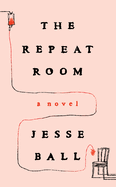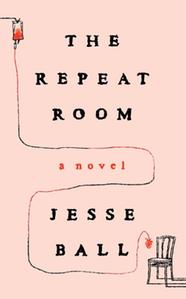
 Novelist and poet Jesse Ball's The Repeat Room is a Kafkaesque descent into a legal system based on an experimental program that allows one juror to have an immersive experience of the defendant's life. Abel, a low-class worker in a near-future society with a strict caste system, has been selected to be the juror to experience the life of a man charged with murder. As he is shuffled through a cold, bureaucratic selection process, he also shares a few glimpses into his own alienated life.
Novelist and poet Jesse Ball's The Repeat Room is a Kafkaesque descent into a legal system based on an experimental program that allows one juror to have an immersive experience of the defendant's life. Abel, a low-class worker in a near-future society with a strict caste system, has been selected to be the juror to experience the life of a man charged with murder. As he is shuffled through a cold, bureaucratic selection process, he also shares a few glimpses into his own alienated life.
Once in the repeat room, however, he is plunged into the suffocating abuse his defendant suffered, and the obsessive sexual relationship that resulted. While Abel was told that the decision would be simple once he spent time in the repeat room, the reader is left to endure the defendant's twisted and horrifying life alongside Abel, only to wonder what kind of "judgment" could possibly come from such a mess and its shocking conclusion.
The contrast between the first and second halves of Ball's mesmerizing novel is stark and effective. In part one, Abel's journey is a labyrinthine yet precise one, carried out with bewildering and often darkly funny exactitude. Ball perfectly captures this uneasy balance with his arresting and yet slightly off-kilter prose. For example, upon seeing the defendant for the first time through a one-way glass, the narrator notes how "The man in the room was apologizing for being tired. Somehow this was the wrong thing to say, and the tenor of things got worse. They asked him to go and face the wall and he did so. He went to the mirror and stood. His face was very close to Abel's, but the man could only see himself." The somewhat procedural nature of this opening section underlines the absurdity of its supposedly perfected system, as well as any individual's inability to correctly perform the roles it expects.
While the novel's second half takes up this same idea, it does so in a startlingly different fashion, sweeping readers up in a dizzying internal monologue that is as horrifyingly inescapable as it is propulsive. As the narrative zooms in on one actor within this world's uncannily familiar structure, it becomes hard to distinguish between the horrors of one man's family and the sins of a larger society. But it also becomes blindingly clear that no one is innocent in a system where a man like this can be found guilty. --Alice Martin, freelance writer and editor
Shelf Talker: Jesse Ball's The Repeat Room is a fast-paced tilt-a-whirl of a social commentary absurdist novel, with insights that will leave readers feeling complicit.

